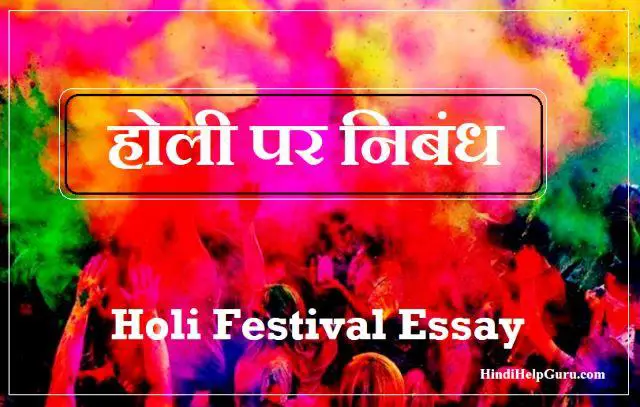Indian Culture Essay For Students: Indian culture is rich and diverse, encompassing a wide range of traditions, customs, languages, cuisines, and clothing styles. It dates back thousands of years and has been shaped by various historical and social influences. When it comes to education, Indian culture plays a significant role in shaping the way students learn and understand the world around them. The study of Indian culture can provide students with a deeper understanding of their own heritage and the world around them.

Historical Context
The history of Indian culture dates back to the ancient Indus Valley civilization, which practiced agriculture, pottery, and trade. In subsequent centuries, various empires and dynasties, such as the Maurya, Gupta, Mughal, and British Empires, have left their mark on Indian culture. Each of these empires contributed to the cultural fabric of India through their art, architecture, religion, and language.
Key Figures
Several influential figures have played a significant role in shaping Indian culture. The most prominent among them include Mahatma Gandhi, Rabindranath Tagore, Swami Vivekananda, and Jawaharlal Nehru. Mahatma Gandhi, known as the “Father of the Nation,” promoted non-violent resistance against British colonial rule and emphasized the importance of traditional Indian values. Rabindranath Tagore, a Nobel laureate poet and philosopher, was a strong advocate for education and encouraged students to embrace their cultural heritage. Swami Vivekananda, a Hindu monk and philosopher, introduced Indian philosophies of Vedanta and Yoga to the western world, inspiring many to explore the depths of Indian spirituality. Jawaharlal Nehru, the first Prime Minister of India, was a strong supporter of education and worked tirelessly to modernize the country’s educational system.
Impact of Indian Culture Essay for Students
The study of Indian culture through essays has a profound impact on students. It allows them to gain a deeper understanding of their own cultural roots while also fostering a sense of appreciation for the diversity of Indian society. Essays on Indian culture enable students to explore various aspects of Indian traditions, festivals, art, music, dance, and literature, providing a holistic view of the country’s rich heritage. Furthermore, essays on Indian culture can help students develop critical thinking skills, empathy, and an open-minded approach to different cultural perspectives.
Influential Individuals in the Field of Indian Culture Essay for Students
Several individuals have made significant contributions to the field of Indian culture essays. Scholars and writers such as Amartya Sen, Arundhati Roy, Vikram Seth, and R.K. Narayan have produced insightful essays that delve into the complexities of Indian culture. These individuals have used their literary prowess to shed light on the social, political, and historical dimensions of Indian culture, offering students a nuanced understanding of the country’s diverse cultural tapestry.
Perspectives on Indian Culture Essay for Students
The study of Indian culture through essays offers multiple perspectives that can be both enlightening and challenging. On one hand, essays on Indian culture can evoke a sense of pride and nostalgia among students, as they connect with the stories, traditions, and values that have been passed down through generations. On the other hand, essays can also provoke critical reflection on issues such as caste discrimination, gender inequality, religious tensions, and modernity’s impact on traditional practices. The exploration of these conflicting perspectives can spur meaningful discussions and encourage students to confront the complexities of Indian culture with an open mind.
Positive Aspects of Indian Culture Essay for Students
Essays on Indian culture have several positive aspects. They provide students with an opportunity to explore the richness and diversity of Indian traditions, fostering a sense of cultural pride and belonging. Additionally, essays can serve as a platform for students to engage with the complexities of Indian society, including its history, art, literature, and philosophy. By studying Indian culture through essays, students can develop a broader perspective on global diversity and gain an appreciation for the value of cultural heritage.
Releated : Dowry System Essay In English
Negative Aspects of Indian Culture Essay for Students
While the study of Indian culture through essays can be enriching, it is also important to acknowledge its negative aspects. Essays on Indian culture may sometimes perpetuate stereotypes or oversimplify the complexities of Indian society, leading to a shallow understanding of its nuances. Furthermore, essays may not always accurately reflect the diverse experiences and realities of different communities within India, leading to a limited and biased portrayal of Indian culture. It is crucial for students to critically engage with essays on Indian culture and seek out diverse perspectives to gain a more comprehensive understanding.
Future Developments in Indian Culture Essay for Students
The field of Indian culture essays is poised for several future developments that could further enrich students’ understanding of India’s cultural heritage. With the rise of digital platforms and social media, students can now access a diverse range of voices and perspectives on Indian culture, allowing for greater inclusivity and representation. Additionally, there is a growing interest in decolonizing the study of Indian culture, with scholars and writers seeking to challenge Eurocentric narratives and present more authentic and diverse portrayals of Indian traditions. As the field continues to evolve, students can look forward to engaging with a more dynamic and inclusive range of essays that reflect the complexities and vibrancy of Indian culture.
Conclusion
Indian culture essays for students play a vital role in nurturing a deeper appreciation and understanding of India’s rich cultural heritage. By exploring the historical context, key figures, impact, influential individuals, perspectives, positive and negative aspects, and future developments related to Indian culture essays, students can develop a more nuanced and empathetic understanding of Indian society. As they engage with the complexities and diversity of Indian culture through essays, students can gain a broader perspective on global diversity, critical thinking skills, and a sense of cultural pride and belonging. It is essential for educators and students alike to approach the study of Indian culture with an open mind and a willingness to engage with its complexities and nuances.






